新目标八年级英语上册Unit 4
- 格式:doc
- 大小:99.50 KB
- 文档页数:8
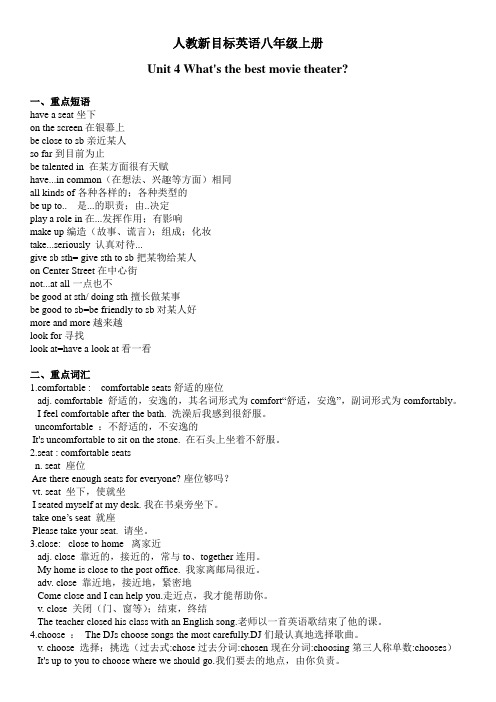
人教新目标英语八年级上册Unit 4 What's the best movie theater?一、重点短语have a seat坐下on the screen在银幕上be close to sb亲近某人so far到目前为止be talented in 在某方面很有天赋have...in common(在想法、兴趣等方面)相同all kinds of各种各样的;各种类型的be up to.. 是...的职责;由..决定play a role in在...发挥作用;有影响make up编造(故事、谎言);组成;化妆take...seriously 认真对待...give sb sth= give sth to sb把某物给某人on Center Street在中心街not...at all一点也不be good at sth/ doing sth擅长做某事be good to sb=be friendly to sb对某人好more and more越来越look for寻找look at=have a look at看一看二、重点词汇fortable : comfortable seats舒适的座位adj. comfortable 舒适的,安逸的,其名词形式为comfort“舒适,安逸”,副词形式为comfortably。
I feel comfortable after the bath. 洗澡后我感到很舒服。
uncomfortable :不舒适的,不安逸的It's uncomfortable to sit on the stone. 在石头上坐着不舒服。
2.seat : comfortable seatsn. seat 座位Are there enough seats for everyone? 座位够吗?vt. seat 坐下,使就坐I seated myself at my desk. 我在书桌旁坐下。

Unit 4 How do you get to school?【语言目标】·How do you get to school? I take the bus. ·How long does it take? It takes 20 minutes. ·How far is it? It’s 10 miles.【应掌握的词组】1. get to school 到校2. get home 到家3. how about=what about …….怎么样?4. take the subway 乘地铁5. ride a bike 骑自行车6. take the bus乘公共汽车7. take the train乘火车8. take a taxi乘坐出租车9. go in a parent’s car 坐父母的车10. by bike, bike bus, by subway, by taxi, by car, by train(乘坐……车,放在句尾)11. have a quick breakfast 迅速吃早饭12. the early bus 早班车 13. how far 多远14. take sb. to sp.带某人到某处15. doing sth. takes sb. Some time/ money =It takes sb. some time/money to do sth. =sb. spends some time/money (on sth.) =sb. spends some time/money (in) doing sth.=sth. costs sb. some time/money=sb. pay some money for sth.花费某人多少时间/金钱做某事/某人花费多少金钱/时间做某事16. bus stop公共汽车站,train station 火车站,subway station地铁站,bus station客运站17. want to do sth.想做某事18. walk to school 步行上学19. in North America 在北美20. in other parts of the world 在世界的其他地区21. depend on=depend upon 依靠,靠……决定22. not all 不是所有的23. need to do sth.需要做某事24. number of students学生数25. a number of=many 许多number前可用large, great, small修饰其谓语是复数26. the number of….的数量,谓语是单数27. don’t worry(about sth./sb.)别着急(为某人/事担心28. around the world= all over the world 世界各地,全世界【应掌握的句子】1. How do you get to school? I walk to school.你是怎样到校的?我步行。
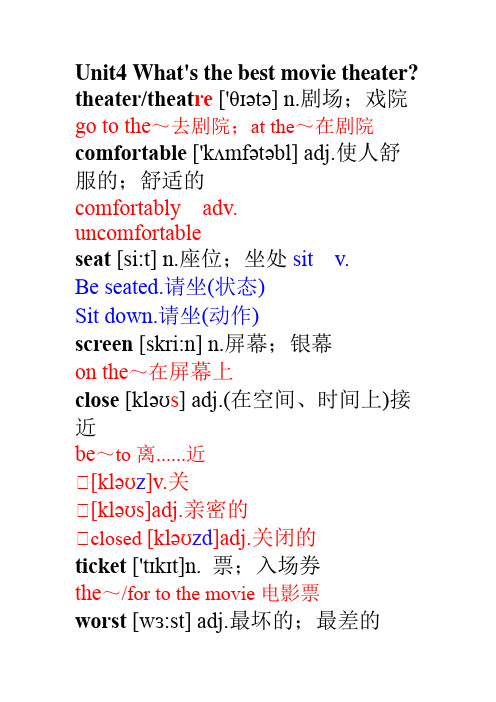
Unit4 What's the best movie theater? theater/theat re ['θɪətə] n.剧场;戏院go to the~去剧院;at the~在剧院comfortable ['kʌmfətəbl] adj.使人舒服的;舒适的comfortably adv.uncomfortableseat [si:t] n.座位;坐处sit v.Be seated.请坐(状态)Sit down.请坐(动作)screen [skri:n] n.屏幕;银幕on the~在屏幕上close [kləʊs] adj.(在空间、时间上)接近be~to离......近①[kləʊz]v.关①[kləʊs]adj.亲密的①closed [kləʊzd]adj.关闭的ticket ['tɪkɪt]n. 票;入场券the~/for to the movie电影票worst [wɜ:st] adj.最坏的;最差的bad/badly/ill-worse-worstgood/well-better-bestcheaply ['tʃi:plɪ] adv.廉价地;低廉地song [sɒŋ] n.歌曲sing; singerDJ ['di:dʒeɪ] n. 音乐节目主持人choose [tʃu:z] v.(chose/tʃəuz/)选择;挑选①后只接to do; ~to do sth①~sb to do sth①~...from...从......中选择①~sth for sb为某人选择某物①choice n.选择carefully ['keəfəlɪ] adv.细致地;小心地;谨慎的careful adj.careless adj.粗心的carelesslyreporter [rɪ'pɔ:tə(r)] n.记者report n./v.报告so far到目前为止;迄今为止用于现在完成时“have/has done”fresh [freʃ] adj. ①新鲜的;清新的①精神饱满的;You look fresh today.①淡的;无盐的fresh water淡水comfortably['kʌmfətəblɪ] adv.舒服地;舒适的worse [wɜ:s] adj.更坏的;更差的bad/badly/ill-worse-worstservice ['sɜ:vɪs] n. 接待;服务U.①serve v.服务;招待;提供serve sth to sb=serve sb (with) sthpretty ['prɪtɪ] ①adv.相当;十分;很①adj.漂亮的menu ['menju:] n.菜单act [ækt] v.扮演;行动;n.表演者①actor n.男演员①actress n.女演员①active adj.积极的①activity n.活动①action n.行动,开拍meal [mi:l] n.早、午、晚餐;膳食C.I have 3 meals a day, breakfast,lunch and supper.creative [krɪ'eɪtɪv] adj.有创造力的;创造性的;performer [pə'fɔ:mə(r)] n.表演者;演员perform v.表演performance n.表演talent ['tælənt] n.天赋;才能U. have~for...有......天赋=be talented in...He has talent for music.have…in common有相同特征;(想法、兴趣等)相同We have much in common.我们有很多共同之处。
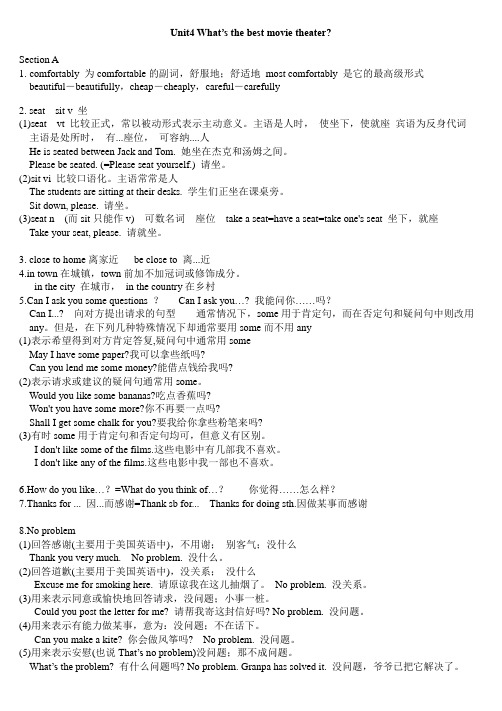
Unit4 What’s the best movie theater?Section Afortably 为comfortable的副词,舒服地;舒适地most comfortably 是它的最高级形式beautiful-beautifully,cheap-cheaply,careful-carefully2. seat sit v 坐(1)seat vt 比较正式,常以被动形式表示主动意义。
主语是人时,使坐下,使就座宾语为反身代词主语是处所时,有...座位,可容纳....人He is seated between Jack and Tom. 她坐在杰克和汤姆之间。
Please be seated. (=Please seat yourself.) 请坐。
(2)sit vi 比较口语化。
主语常常是人The students are sitting at their desks. 学生们正坐在课桌旁。
Sit down, please. 请坐。
(3)seat n (而sit只能作v) 可数名词座位take a seat=have a seat=take one's seat 坐下,就座Take your seat, please. 请就坐。
3. close to home离家近be close to 离...近4.in town在城镇,town前加不加冠词或修饰成分。
in the city 在城市,in the country在乡村5.Can I ask you some questions ?Can I ask you…? 我能问你……吗?Can I...? 向对方提出请求的句型通常情况下,some用于肯定句,而在否定句和疑问句中则改用any。
但是,在下列几种特殊情况下却通常要用some而不用any(1)表示希望得到对方肯定答复,疑问句中通常用someMay I have some paper?我可以拿些纸吗?Can you lend me some money?能借点钱给我吗?(2)表示请求或建议的疑问句通常用some。
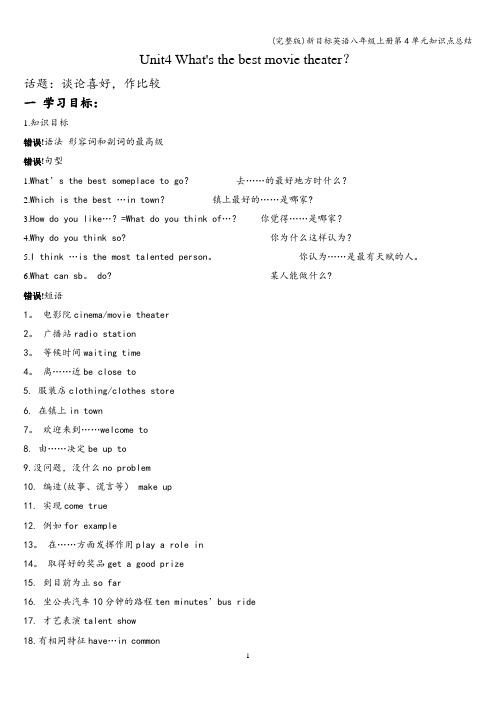
Unit4 What's the best movie theater?话题:谈论喜好,作比较一学习目标:1.知识目标错误!语法形容词和副词的最高级错误!句型1.What’s the best someplace to go?去……的最好地方时什么?2.Which is the best …in town?镇上最好的……是哪家?3.How do you like…?=What do you think of…?你觉得……是哪家?4.Why do you think so? 你为什么这样认为?5.I think …is the most talented person。
你认为……是最有天赋的人。
6.What can sb。
do? 某人能做什么?错误!短语1。
电影院cinema/movie theater2。
广播站radio station3。
等候时间waiting time4。
离……近be close to5. 服装店clothing/clothes store6. 在镇上in town7。
欢迎来到……welcome to8. 由……决定be up to9.没问题,没什么no problem10. 编造(故事、谎言等) make up11. 实现come true12. 例如for example13。
在……方面发挥作用play a role in14。
取得好的奖品get a good prize15. 到目前为止so far16. 坐公共汽车10分钟的路程ten minutes’bus ride17. 才艺表演talent show18.有相同特征have…in common19. 各种各样的all kinds of20。
认真对待……take…seriously21。
挤满了be crowded with22。
给某人某物give sb sth/give sth to sb23.播放最无聊的歌曲play the most boring songs24散步take walks25观看某人做某事watch sb do sth26.大屏幕big screens27.最……之一one of the +adj—est +名次复数28.28.全世界around /all over the world29。

【人教版】新目标八年级英语上册:Unit 4 单元教学设计一. 教材分析人教版新目标八年级英语上册Unit 4主要介绍了日常生活中的交通工具,以及人们在交通方面的观点和态度。
通过本单元的学习,学生能够掌握有关交通工具的词汇和表达方式,学会描述自己的交通方式,并在实际情境中运用所学知识进行交流。
二. 学情分析八年级的学生已经具备了一定的英语基础,对于日常生活中的事物和情境有了一定的认识。
但部分学生在英语口语表达方面还存在困难,需要通过大量的练习来提高。
此外,学生对于交通方面的知识和观点可能了解不多,需要在教学过程中加以引导和拓展。
三. 教学目标1.知识目标:学生能够掌握有关交通工具的词汇和表达方式,了解日常生活中的交通方式,以及不同人在交通方面的观点和态度。
2.能力目标:学生能够运用所学知识进行日常交流,提高英语口语表达能力。
3.情感目标:学生能够养成良好的交通习惯,关注交通安全,树立正确的交通观念。
四. 教学重难点1.重点:掌握有关交通工具的词汇和表达方式,能够在实际情境中运用所学知识进行交流。
2.难点:对于不同人在交通方面的观点和态度的理解,以及如何在实际情境中运用所学知识进行交流。
五. 教学方法1.任务型教学法:通过设定各种交通情境,让学生在完成任务的过程中运用所学知识,提高实际运用能力。
2.情境教学法:创设各种真实的交通情境,激发学生的学习兴趣,提高学生的参与度。
3.小组合作学习:鼓励学生分组讨论,培养学生的团队协作能力和口头表达能力。
六. 教学准备1.教学课件:制作与Unit 4相关的课件,包括交通工具的图片、视频等,以便于引导学生进行学习。
2.学习材料:准备有关交通的阅读材料,帮助学生拓展视野,提高阅读能力。
3.教学道具:准备一些交通工具的模型或图片,方便学生进行直观的学习和理解。
七. 教学过程1.导入(5分钟)通过展示一些交通工具的图片,引导学生谈论自己喜欢的交通工具,激发学生的学习兴趣。

【人教版】新目标八年级英语上册:Unit 4 单元说课稿一. 教材分析新目标八年级英语上册Unit 4主要围绕着“过去进行时”的语法知识点展开。
这一单元的话题是关于过去发生的事情,通过学习让学生能够运用过去进行时描述过去正在进行的动作。
教材通过丰富的生活情境,引导学生理解和运用过去进行时,提高他们的语言运用能力。
二. 学情分析学生在学习这一单元之前,已经掌握了基本的英语语法知识,对动词时态有了初步的了解。
但他们在运用过去进行时方面可能会遇到困难,因此需要通过实例和练习来加强理解和运用。
此外,学生需要提高听、说、读、写四项基本技能,特别是在口语表达和写作方面。
三. 说教学目标1.知识目标:让学生掌握过去进行时的构成、意义和用法,能够正确运用过去进行时描述过去正在进行的动作。
2.能力目标:提高学生的听、说、读、写能力,使他们能够在实际情境中运用过去进行时。
3.情感目标:激发学生学习英语的兴趣,培养他们积极向上的学习态度。
四. 说教学重难点1.重点:过去进行时的构成、意义和用法。
2.难点:如何运用过去进行时描述过去正在进行的动作,以及如何在实际情境中正确使用。
五. 说教学方法与手段1.采用任务型教学法,让学生在完成任务的过程中,自然地学习和运用过去进行时。
2.运用多媒体教学手段,如课件、视频等,为学生提供丰富的学习资源,提高他们的学习兴趣。
3.小组讨论和课堂展示,激发学生的合作意识和竞争意识。
六. 说教学过程1.导入:通过提问学生昨天做了什么,引导学生思考过去正在进行的动作,激发他们对过去进行时的兴趣。
2.呈现:通过课件展示过去进行时的结构,让学生初步了解过去进行时的概念。
3.讲解:详细讲解过去进行时的构成、意义和用法,并通过实例进行说明。
4.练习:设计不同类型的练习题,让学生在实际操作中掌握过去进行时的运用。
5.运用:学生进行小组讨论,让他们运用过去进行时描述过去发生的事情。
6.总结:对本节课的内容进行总结,强调过去进行时的关键点。

新目标八年级上册英语Unit4基础知识练习题及答案一、用所给词的适当形式填空(10分)11. He is much better than others at (find) the most interesting roles.12. Dumpling House is (cheap) restaurant in the city.13. Some students in our school are truly (talent).14. Saying is much (easy) than doing.15. Linda’s car is (expensive) than Lucy’s.6. Linda is the(win)of the English speech contest.7. I think Li Yundi is a(talent)piano player.8. Lots of(perform)from different places around China took part in the talent show.9. There are all(kind)of vegetables and fruit in the shop.10. I can hear birds singing(beautiful)while walking through the park.二、根据首字母及汉语意思补全单词(15分)1.Mr.Smith likes living in the countryside. Because the air there is very f_______.2.Yesterday afternoon, I watched a wonderful movie in the movie t________ . 3.Her little daughter can sing a few English s________.4.Look!The name of the movie is on the s________.5.Moon Cinema has the most c________seats. I usually go there to watch movies.6. Mo Yan won the 2012 Nobel P in Literature(文学).7. It’s true that parents play an important r in children’s lives.8. He doesn’t have any money. He is p.9. Can you give me an(范例)of how to improve speaking skills?10. There are too many people in the subway. It’s really(拥挤的).11. Don’t stand there. Come here and take this s.12. Here is the m. You can order the dishes now.13. Betty can sing lots of English s.14. Both of them are(获胜者)of the speech competition.15. Thank you for(提供)me so much help.三、句型转换(10分)1.Monica is thinner than the other two girls.(改为同义句)Monica is _____ ______of the three girls.2.Cathy's Store is the best clothes store in town.(改为一般疑问句)________ Cathy's Store the best clothes store in town?3.I think that radio station is_pretty_good.(对画线部分提问)________ ________ ________ ________ ________ that radio station?4.The green jacket is cheaper than the blue one.(改为同义句)The blue jacket is ________ ________ than the green one.5.The City Park is more crowded than any other place on weekends.(改为同义句)四、从方框中选择适当的句子补全对话。

新目标八年级英语上册unit4(1a---1c)说课稿各位评委、老师上午好!今天我说课的内容是:由人民教育出版社出版的新目标英语八年级上册Unit4 How do you get to school?第一课时(1a---1c)。
下面我从教材、教法与学法、课时安排、教学过程的设计等方面作简要的说明。
一、教材分析(一)教材的地位和作用本课为新目标八年级上册第四单元的第一课时。
本单元的中心话题是“transportation”,它与学生的日常生活紧密联系在一起,本课的教学围绕“谈论如何去上学”这一话题展开教学,引导学生通过本课的语言素材看图说话、句型操练、实际描述,对话表演使学生学会用英语。
本课还学习以how引导的特殊疑问句,通过问答训练,进一步提高学生听、说、读、写综合素质能力。
(二)教学目标(知识目标、能力目标、情感目标、学习策略目标)1.知识目标(1)掌握新单词:subway hey train并且通过教学让学生把握本课的词汇运用(2)掌握以how引导的特殊疑问句的问答How do you get to school ? How does he / she get to school?2.能力目标指导学生在自主探究和任务型教学模式中,让学生学会用英语与他人谈论……的话题,以及进一步提高听力能力和英语语言表达能力。
3.情感目标发挥学生的潜能,能谈论(自己及周围人的上学,上班,回家,或旅游的交通方式,调动学生应用英语的积极性,学会关心别人。
)通过师生在教学的双边活动中主动性和创造性的发挥,激发学生的学习爱好,体验英语语言的美,体验知识间的相互应用、相互依存、联系,让学生布满自信,体验成就感和合作精神。
确立教学目标的依据:根据英语教学大纲规定,通过听、说、读、写的训练,使学生获得英语基础知识和为交际初步运用英语的能力,激发学生的学习兴趣,为进一步学习打好初步的基础。
此外,也根据我国国情和外语教学大纲的要求,根据现阶段外语教学的素质教育的要求.(三)教学重点、难点及其解决方法:根据本课的教学内容及在本单元中的地位,与学生的实际情况,制定以下的重点与难点:1.重点:以how引导的特殊疑问句;How do you get to school ?How does he/she get to school?I take the bus . He/She takes the train.2.难点:多种搭乘交通工具的表达方式3.解决方法:对于重点、难点词汇、句型,在讲解的基础上,尽量多举例,结合学生感兴趣的例子分析句型,并随堂及课后多做习题,也可让学生自己思考、造句或编对话以巩固新知识。
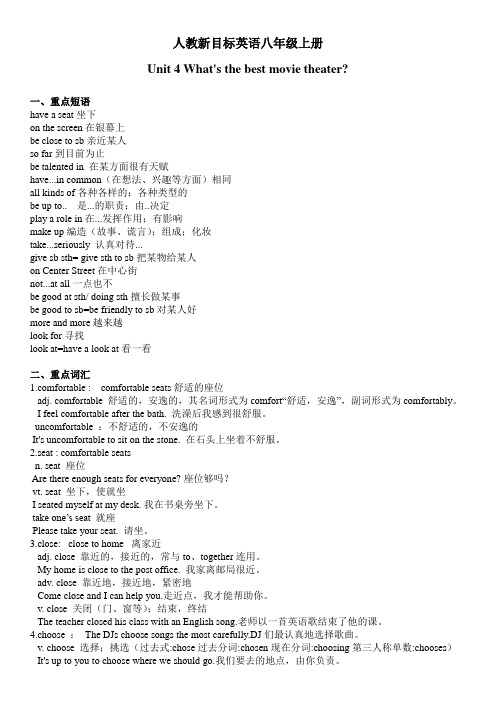
人教新目标英语八年级上册Unit 4 What's the best movie theater?一、重点短语have a seat坐下on the screen在银幕上be close to sb亲近某人so far到目前为止be talented in 在某方面很有天赋have...in common(在想法、兴趣等方面)相同all kinds of各种各样的;各种类型的be up to.. 是...的职责;由..决定play a role in在...发挥作用;有影响make up编造(故事、谎言);组成;化妆take...seriously 认真对待...give sb sth= give sth to sb把某物给某人on Center Street在中心街not...at all一点也不be good at sth/ doing sth擅长做某事be good to sb=be friendly to sb对某人好more and more越来越look for寻找look at=have a look at看一看二、重点词汇fortable : comfortable seats舒适的座位adj. comfortable 舒适的,安逸的,其名词形式为comfort“舒适,安逸”,副词形式为comfortably。
I feel comfortable after the bath. 洗澡后我感到很舒服。
uncomfortable :不舒适的,不安逸的It's uncomfortable to sit on the stone. 在石头上坐着不舒服。
2.seat : comfortable seatsn. seat 座位Are there enough seats for everyone? 座位够吗?vt. seat 坐下,使就坐I seated myself at my desk. 我在书桌旁坐下。
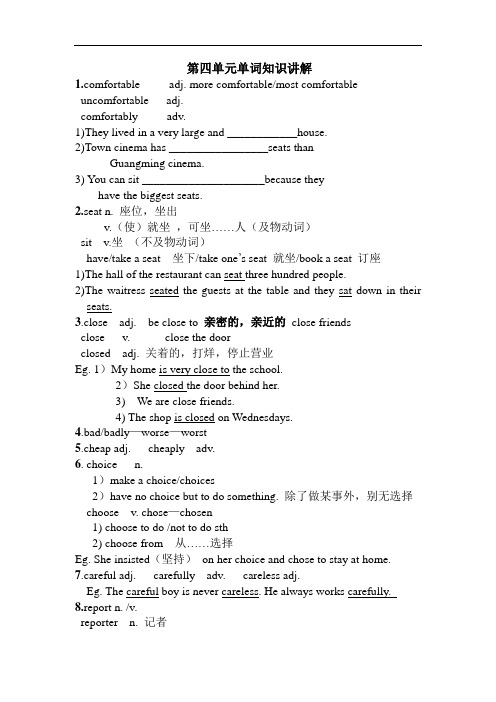
第四单元单词知识讲解fortable adj. more comfortable/most comfortable uncomfortable adj.comfortably adv.1)They lived in a very large and ____________house.2)Town cinema has _________________seats thanGuangming cinema.3) You can sit _____________________because theyhave the biggest seats.2.seat n. 座位,坐出v.(使)就坐,可坐……人(及物动词)sit v.坐(不及物动词)have/take a seat 坐下/take one’s seat 就坐/book a seat 订座1)The hall of the restaurant can seat three hundred people.2)The waitress seated the guests at the table and they sat down in their seats.3.close adj. be close to 亲密的,亲近的close friendsclose v. close the doorclosed adj. 关着的,打烊,停止营业Eg. 1)My home is very close to the school.2)She closed the door behind her.3) We are close friends.4) The shop is closed on Wednesdays.4.bad/badly—worse—worst5.cheap adj. cheaply adv.6. choice n.1)make a choice/choices2)have no choice but to do something. 除了做某事外,别无选择choose v. chose—chosen1) choose to do /not to do sth2) choose from 从……选择Eg. She insisted(坚持)on her choice and chose to stay at home.7.careful adj. carefully adv. careless adj.Eg. The careful boy is never careless. He always works carefully.8.report n. /v.reporter n. 记者9.service n. serve v. 提供服务,为……服务10. act n. Actor 男演员actress 女演员11.creative adj. more creative/ most creativecreate v.Eg. Scientists hope to create creative AI(人工智能)12.performer n. 演员,表演者perform v. 表演performance n. 表演Eg. Lucy‘s sister is a talented performer. We are watching her performance in the theater. She performs very well.13.talent n. 天资,天赋talent show 才艺表演talented adj. 有天赋的be talented in 在……有天赋Eg. 1)My brother is a man of many talents.2)He is a talented player.3)He is talented in drawing14.magician n. 魔术师magic n. 魔术15. be up to 是……的职责,由……决定It’s up to you. 由你决定16.example n. 例子,榜样set an example树立榜样give an example 举个例子for example 例如17. poor adj. ---rich adj. 差的the poor 穷人the rich 富人18. take……seriously 认真对待Eg. Please take what the teacher said seriously.19.crowed adj.be crowed with 挤满了……Eg. In spring, this place is crowded with visitors.。

Unit 4 How do you get to school?一、重点单词v动词:take花费(时间)shower淋浴depend 依赖worry担心n名词:subway 地铁train火车minute分钟kilometer公里,千米bicycle自行车mile英里stop车站transportation 公共交通part地区river河,江boat小船means 方法car小汽车town镇,城镇num基数词:forty四十fifty五十sixty六十seventy七十eighty八十ninety九十hundred一百adj形容词:far远的,遥远的how far 多远quick快的(反:slow 慢的)early早的(反:late 晚的)north北部的more比……更多地ill生病的(名词形式:illness)adv副词:more更,更多的so这么,那么much十分,非常conj连词:than比prep介词:by表示交通、传递等的方式by bus/trainmodal情态动词:must(表示推测)一定二、重点短语1.get to school 到达学校2. how about 怎样3.ride my bike(bicycle) 骑自行车4.take the subway/train/bus/boat 乘地铁/火车/汽车/船5.how long 多久how far 多远6.about 10 kilometers 大约10千米7.have a quick breakfast 很快吃完早餐8.leave for 出发前往leave for school 动身去学校9.at around six thirty 大约六点半10.bus stop 公共汽车站bus station 汽车站subway station 地铁站train station 火车站11.the early bus 早班车12.on foot 步行by/bike/subway/train/car/boat13.from your home to school 从你家到学校14.get from home to school 从家到学校15.two kinds of transportation 两种交通工具16.students around the world 世界各地的学生17.in North American 在北美洲18.on the school bus 乘坐校车19.in other parts of the world 在世界的其他地方区别:other(别的)+名词复数others不定代词别的东西=other+名词20.things are different 情况有所不同21.depend on 视……而定,取决于22.most students 大部分学生some students 一些学生other students 其他学生23.in big cities 在大城市里24.must be 一定25.a lot more fun 更有趣副词more修饰fun26.not all students 不是所有的学生27.be different from 不同于28.three most popular ways 最受欢迎的三种方式29.the most popular means of transportation 最流行的三种交通工具30.have to 不得不31.a small number of students 很少的学生32.live from school 住的地方离学校live 10 miles from school 住的地方离学校有10英里远33.on the weekend 在周末34.think of the transportation 觉得交通工具怎么样35.in your town 在你们的镇里36.need to see my friend 要看我的朋友37.be ill 病了she is ill 她病了38.in the hospital 在医院里39.it’s in Chinese 它是中文版的40.get there 到达那儿there是副词,前面不加“to”41.Don’t worry. 不要担心42.let me look at your map 让我看看你的地图43.You’re welcome. 不客气44.have a problem 遇到问题三、重点句型1.——How do you get to school? 你怎样去上学的?——I take the subway. 我坐地铁。
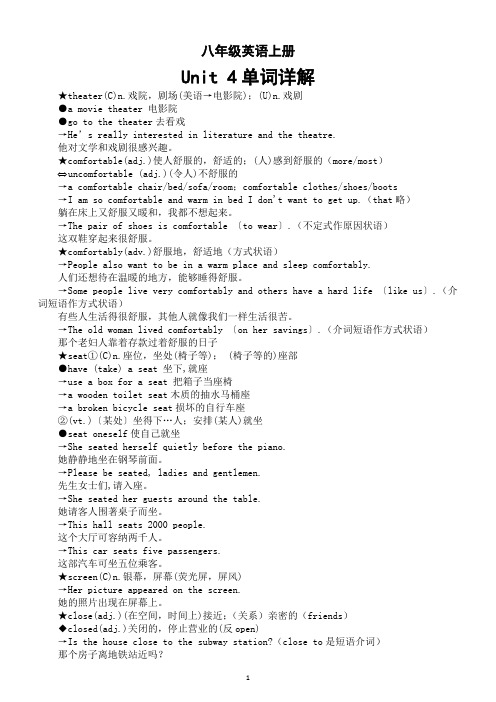
八年级英语上册Unit 4单词详解★theater(C)n.戏院,剧场(美语→电影院);(U)n.戏剧●a movie theater 电影院●go to the theater去看戏→He’s really interested in literature and the theatre.他对文学和戏剧很感兴趣。
★comfortable(adj.)使人舒服的,舒适的;(人)感到舒服的(more/most)⇔uncomfortable (adj.)(令人)不舒服的→a comfortable chair/bed/sofa/room;comfortable clothes/shoes/boots→I am so comfortable and warm in bed I don't want to get up.(that略)躺在床上又舒服又暖和,我都不想起来。
→The pair of shoes is comfortable 〔to wear〕.(不定式作原因状语)这双鞋穿起来很舒服。
★comfortably(adv.)舒服地,舒适地(方式状语)→People also want to be in a warm place and sleep comfortably.人们还想待在温暖的地方,能够睡得舒服。
→Some people live very comfortably and others have a hard life 〔like us〕.(介词短语作方式状语)有些人生活得很舒服,其他人就像我们一样生活很苦。
→The old woman lived comfortably 〔on her savings〕.(介词短语作方式状语)那个老妇人靠着存款过着舒服的日子★seat①(C)n.座位,坐处(椅子等); (椅子等的)座部●have (take) a seat 坐下,就座→use a box for a seat 把箱子当座椅→a wooden toilet seat木质的抽水马桶座→a broken bicycle seat损坏的自行车座②(vt.)〔某处〕坐得下…人;安排(某人)就坐●seat oneself使自己就坐→She seated herself quietly before the piano.她静静地坐在钢琴前面。
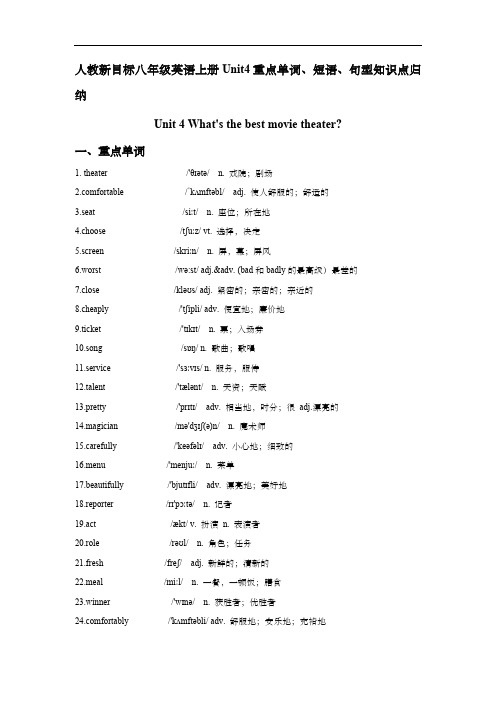
人教新目标八年级英语上册Unit4重点单词、短语、句型知识点归纳Unit 4 What's the best movie theater?一、重点单词1. theater /'θɪətə/n. 戏院;剧场fortable /ˈkʌmftəbl/adj. 使人舒服的;舒适的3.seat /siːt/n. 座位;所在地4.choose /tʃuːz/ vt. 选择,决定5.screen /skriːn/n. 屏,幕;屏风6.worst /wə:st/ adj.&adv. (bad和badly的最高级)最差的7.close /kləʊs/ adj. 紧密的;亲密的;亲近的8.cheaply /'tʃipli/ adv. 便宜地;廉价地9.ticket /'tɪkɪt/n. 票;入场券10.song /sɒŋ/ n. 歌曲;歌唱11.service /'sɜːvɪs/ n. 服务,服侍12.talent /'tælənt/n. 天资;天赋13.pretty /'prɪtɪ/adv. 相当地,时分;很adj.漂亮的14.magician /mə'dʒɪʃ(ə)n/n. 魔术师15.carefully /'keəfəlɪ/adv. 小心地;细致的16.menu /'menjuː/n. 菜单17.beautifully /'bjutɪfli/adv. 漂亮地;美好地18.reporter /rɪ'pɔːtə/n. 记者19.act /ækt/ v. 扮演n. 表演者20.role /rəʊl/n. 角色;任务21.fresh /freʃ/adj. 新鲜的;清新的22.meal /miːl/n. 一餐,一顿饭;膳食23.winner /'wɪnə/n. 获胜者;优胜者fortably /'kʌmftəbli/ adv. 舒服地;安乐地;充裕地25.creative /kriː'eɪtɪv/adj. 创造性的;有创造力的26.prize /praɪz/n. 奖品;奖赏;战利品27.worse /wəːs/adj. 更坏的;更差的;更恶劣的(bad和badly的比较级)28.performer /pə'fɔːmə(r)/n. 演出者;执行者;演奏者29.example /ɪg'zɑːmp(ə)l n. 例子;实例30.seriously /'sɪərɪəslɪ/ adv. 认真地;严重地,严肃地31.crowded /'kraʊdɪd/adj. 人多的;拥挤的;挤满的32.poor /pɔ:(r)/ adj. 贫穷的;清贫的二、重点短语1.waiting time 等待时间2. buy tickets quickly 购票快fortable seats 舒适的座椅4.buy clothes the most cheaply买衣服最便宜5.choose songs the most carefully选择歌曲最用心6.play the most boring songs播放最无聊的歌曲7.so far 到目前为止8.sit the most comfortably坐得最舒服9.not …at all 根本不10.have the worst service有最糟糕的服务11.10 minutes by bus. 十分钟车程12.be good at doing sth.擅长做某事13.talent show 才艺表演14.more and more popular越来越受欢迎15.thanks for doing sth. 因……而感谢16.similar shows相似的节目17.all over the world /around the world 世界各地18.such as /for example例如19.have…in common 有共同特征20.look for寻找21.the most talented dancer 最有天赋的舞者22.the most exciting magician最令人兴奋的魔术师23.all kinds of 各种各样的24.play the piano the best弹钢琴最好25.sing the most beautifully 唱歌最动听26.be up to由……决定27.play a role in doing sth. 参与, 有影响, 扮演……的角色28.get a very good prize获得很好的奖品29.the lives of the performers 表演者生活30.make up 编造31.in fact 事实上32.take……seriously认真对待……33.make their dreams come true使他们的梦想成真34.on weekends在周末35.take walks.散步36.be crowded with拥挤,挤满一、用所给词的适当形式填空。

互动课堂知识要点归纳新目标英语八年级(上)Unit4知识要点归纳【重点词组或短语】1.be the closest to home离家最近2.the shortest waiting time最短的等候时间3.welcome to...欢迎来某地4.play the most boring songs播放最乏味的歌曲5.be new to...新来某地6.pretty good相当好7.the freshest food最新鲜的食物8.so far到目前为止9.the best performer最好的演员10.the most talented person最有天赋的人11.more and more popular越来越受欢迎12.have...in common在……有共同之处.cn. All Rights Reserved.13.the funniest actors最风趣的演员14.all kinds of各种各样的15.show their talent展示他们的才艺16.sing the most beautifully唱得最美妙17.be up to是……的职责;由……决定18.play a role发挥作用;有影响19.make up编造(故事、流言等)20.for example例如21.take...seriously认真对待e true实现【重难点句子】1.He’s much better than other actors at finding the most interesting roles.他在发现最有意思的角色这一方面比其他演员要擅长得多。
2.It’s always interesting to watch other people show their talents.看人们表演他们的才艺总是很有趣。
3.Talent shows are getting more and more popular.才艺表演越来越受欢迎。

人教新目标英语八年级上册Unit 4 知识点归纳总结学习目标:1、本节课主要学习八上U4基础知识2、语法:掌握adj和adv的最高级的用法。
一.重点词汇fortable adj. 舒适的;安逸的My home is not big, but it is comfortable.我的房子不大,但很舒适。
Which cinema is the most comfortable? 那个电影院是最舒适的?【拓展】比较级:more comfortable 最高级:most comfortable 反义词:uncomfortable.2.close v.关;合拢;不开放;停业She closed the door slowly.她轻轻地关上门。
【拓展】close adj.近的,接近,指距离上“近的”His home is close to the factory. 他家靠近工厂。
比较级:closer 最高级:closest反义词:far 近义词:near【搭配】be close to “离......近”3.carefully adv.小心地,认真地You should do your homework carefully. 你应该认真地做作业。
【拓展】反义词:careless adj. 粗心的最高级:most carefully,修饰动词时放在其后careful adj.细致的;小心的;谨慎的careful常见短语:be careful of 当心...小心...4.choose v.选择Which one do you want to choose?你想要选择哪一个?It's up to you to choose where we should go.我们要去的地点,由你负责选择。
Start to choose a hobby.开始选择一项爱好。
【拓展】第三人称单数:chooses过去式:chose 过去分词:chosen现在分词:choosing5.reporter n.记者He is a TV reporter. 他是一个电视记者。

人教版新目标英语八年级上册《Unit 4 What’s the best movie theater Section B 3a-4Self check》教学设计1一. 教材分析人教版新目标英语八年级上册《Unit 4 What’s the best movie theater Section B3a-4 Self check》主要讲述了关于电影院的选择和推荐。
通过本节课的学习,学生能够掌握有关电影院的各种词汇,如screen, seating, snacks等,以及表达自己观点的句型“What’s the best…? It’s because…”。
本节课的内容与学生的生活息息相关,有利于激发他们的学习兴趣。
二. 学情分析八年级的学生已经具备了一定的英语基础,能够听懂并运用简单的英语进行交流。
但是,学生在表达自己观点时,往往缺乏逻辑性和条理性。
因此,在教学过程中,教师需要帮助学生更好地语言,提高他们的表达能力。
三. 教学目标1.知识目标:学生能够掌握有关电影院的各种词汇,如screen, seating,snacks等,以及表达自己观点的句型“What’s the best…? It’s because…”。
2.能力目标:学生能够在真实场景中运用所学知识,表达对电影院的选择和推荐。
3.情感目标:通过本节课的学习,学生能够培养与人分享和交流的习惯,提高团队合作意识。
四. 教学重难点1.重点:掌握有关电影院的各种词汇,如screen, seating, snacks等,以及表达自己观点的句型“What’s the best…? It’s because…”。
2.难点:能够运用所学知识,在真实场景中表达对电影院的选择和推荐。
五. 教学方法1.情境教学法:通过设定真实场景,让学生在实践中学习和运用所学知识。
2.交际教学法:引导学生进行小组讨论,培养他们的团队合作意识和交际能力。
3.任务型教学法:通过完成具体任务,让学生在实际操作中提高英语运用能力。
八年级英语上册执笔:侯苗审核:妙芳课型:新授2010-9-27注意区分:I ride my bike toschool.I go to school bybike.注意:先用英语表达出各种交通方式,然后根据问题作出回答。
__________ __________ __________ How do you get to school?I __________________________________.I __________________________________.I __________________________________.How does your friend get to school?He /She __________________________________.___________________________________________.___________________________________________.反馈练习:I. 用合适的单词填空。
1. How do you get________school? And how do youget________home?2. I usually go to school ________bus.3. Dave, how does your father________(go) to workevery day?4. We have no time to walk there, let’s________(take) abus.5. How do you get to school? 划线部分可用________替换。
6. I walk to school. How about you? 划线部分可用________________替换。
日清:1. 单词和短语要会读,会写,会翻译,会说句子。
2. 背诵1a对话。
注:询问你的朋友上学所采用的交通方式,回答问题。
八年级英语上册执笔:侯苗审核:妙芳课型:新授2010-9-28———————————————————————Unit 4 How do you get to school?Period 2教学内容:Section A 2a, 2b, 2c, Grammar Focus.学习目标:1. 识记数字20---100。
2. 询问他人平时使用的交通方式及所花费的时间。
预习导航:1.找找看。
35 __________ 93__________58__________ 123__________48__________ 104_________2.学习take的用法。
仔细观察下面的例句,补全结论。
【例句】1. Can you take the English book to your sister?2. I usually take a train to visit my friends.3. It takes me three hours to get to Shanghai.【结论】1.从例1中可知,take意为__________。
常用结构为take_____to____或take _____ ____.2.从例2中可知,take意为__________,后面常加_________。
3.从例3中可知,take意为__________。
当意为________时,句子结构为:_____+take(takes)+ _____+时间+____+其它。
学习过程:1.学习本课单词和短语。
2.分配学习任务,以小组为单位合作探究。
3.由每个小组展示所分配到的学习任务。
其他组的同学可补充、纠错。
你能试着总结出数字的表达法吗?1.大于20的十位数表示法:2.百位数字表达法为:提示:take the bag to Davetake Dave the bag4.练习课本P20 2d 对话。
并试着使用本单元所学新单词编新对话。
5.学习Grammar Focus.反馈练习:I. 汉译英。
1. 下雨时,我妈妈坐出租车去上班。
When it ________, my mother ________a taxi to work.2.周末我喜欢骑自行车。
I like________ ________my bike on the weekends.3. 这趟航班要飞多久?________ ________does the flight take?4.我写作业花了一个小时。
It ________me an hour________ do homework.5. 你妹妹平时怎样去上班?________ ________your sister usually ________to work?II. 补全对话。
A: ____________________________________B: Well, I ride my bike.A: Do you always ride bike to school?B: __________________. Sometimes I walk toschool. A: ____________________________________B: It takes about 15 minutes to ride bike __________ ___________________________.a.No, I don’t.b.and 30 minutes to walk there.c.How do you get to work?d.How do you get to school?e.Yes, I do.f.How long does it take?日清:1. 熟记本课单词,短语。
3.背诵Grammar Focus. 注意:1.主语人称和数的变化。
2. like的用法。
a. like+ n.b. like+to+动词原形c. like+动词-ing八年级英语上册执笔:侯苗审核:妙芳课型:新授2010-9-29 ———————————————————————Unit 4 How do you get to school?Period 3教学内容:Section A 3a, 3b.学习目标:1. New words.far kilometer shower quick bicycle early mile2. Phrases.(找一找,查一查)how long __________ how far __________ from…to…__________ take a shower__________ have a quick breakfast __________________about ten kilometers __________________leave for ___________ the bus station __________ the early bus __________ the bus ride __________ 3. Sentences.How does he get to school?____________________________________How long does it take?____________________________________How far is it from his home to school?____________________________________The bus ride usually takes about 25 minutes.____________________________________教学过程:1.让一些同学读读新单词,强调个别易错单词的发音。
2.听写本课单词。
3.分任务给每个小组。
组长组织小组成员合作探讨本组学习内容。
4.分小组展示。
注:1.从单词表中找出这些单词的意思。
2. 熟读这些单词,并试着拼写。
注:take在此处意为__________。
5.仿写对话。
仔细阅读课本P21所给对话,根据图片提示信息仿写对话。
并将仿写的对话展示在白板上。
反馈练习:I. 根据汉语提示,完成句子。
1. The children plan to _______ ________ _________(乘出租车)to the museum.2. We often _________ _________ _________(骑自行车)to the park.3. His mother often gets up________ _______ ________(大约5点).4.Her uncle is_________ _________(要动身去)HongKong next Sunday.5.Mr Li is taking_________ _________ _________(早班火车)to Shanghai.6._________ _________(多远) is your home from youruncle’s home?7.He always_________ _________ _________(起床晚),so he always ________ _______ ________ _________ (匆匆吃早餐)。
8.The _________ _________(车程) usually takes about25 minutes.II. 句型转换。
1.Li Lei takes a bus to the park every Sunday. (改为同义句)Li Lei_______to the park_______bus every Sunday.2.Arthur takes a train to his office. (对划线部分提问)_________ _________Arthur_________to his office?3.Charles rides his bike to the club. (改为同义句)Charles________to the club________bike.Charles________to the club________ _________bike. 日清:1. 牢记本课单词、短语。
2. 熟读P21 3b对话,好学生需要背诵。
八年级英语上册执笔:侯苗审核:妙芳2010-9-30第五周周清检测I.单项选择。